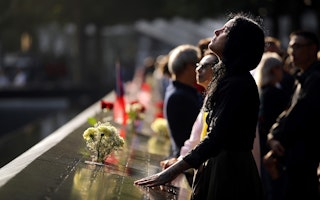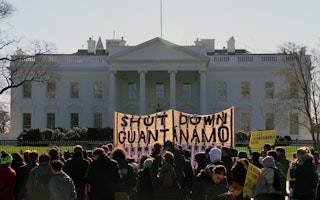Security Versus Liberty
By Nancy Chang

When President Obama announced last month that U.S. forces had tracked down and killed Osama Bin Laden, young adults were intensely and distinctively affected. For some of them, the news seemed to release a little of the haunting fear they had been living with since the Twin Towers fell.
Their formative years were shaped by a horrific act of violence that changed everything, ushering our nation into a decade of shadowy, unending wars against elusive enemies, and the threat of terrorism became a justification for previously unimaginable government actions. Many young people are not, however, fully aware of the drastic, disastrous ways in which many of these policies have deviated from our nation’s core constitutional and human rights values.
A new high school debate book, Securing Liberty, edited by Georgetown law professor David Cole, traces the controversial national security policies enacted in the months and years following 9/11. The book encourages students to think critically about racial profiling, torture and accountability, preventive detention, surveillance, and privacy. The Open Society Foundations partnered with the International Education and Debate Association (IDEA) to publish the book.
The dialogue around Securing Liberty begins this Saturday with a round-robin debate tournament at Stuyvesant High School in New York City, not far from Ground Zero. With the news of Bin Laden’s death barely behind us and the tenth anniversary of 9/11 just ahead, now is an opportune time to engage students in the issues tied to these events—especially because young people bring a unique set of experiences to the table.
In this interview with David Cole, incoming high school senior Stephanie Franklin asks about the challenges of conveying the larger context of civil liberties post-9/11 to students who can’t remember a world before the terror attacks.
America seems to be shifting toward a “new normal” in which civil liberties get sacrificed in the name of national security. During the first post-9/11 generation’s lifetime, the U.S. government authorized torture, ethnic profiling, and the secret surveillance of American citizens. Such shortsighted, immoral, and illegal practices conflict with our nation’s most fundamental principles, undermine our role as a human rights leader in the international community, polarize our relationship with the Muslim world, and jeopardize our long-term safety. Nevertheless, many lawmakers and civilians alike have come to accept and defend these policies on the grounds that frightening times call for extreme measures.
Today’s high school students will play an integral role in shaping the next chapter of our nation’s story, and it’s crucial that we engage them now. Polls suggest that they are more patriotic than Gen-Xers or Baby Boomers, and that they are also more open-minded. Who better, then, to fight to restore America’s core values, to hold our government accountable for its inhumane acts, and to stop the bigotry toward American Muslims that would destabilize the foundation our nation was built upon, the promise of religious tolerance?
The younger generation needs to be well-informed about the choices lawmakers and voters have made in the recent past in order to find the best solutions for the future. Debating the issues is an excellent way to start. The topics addressed in Securing Liberty are complex and controversial, but the chapters provide the necessary vocabulary for ongoing national discourse about our policies, values, and forward path. The book presents careful arguments from opposing camps on every issue so students can study, reflect, and form their own conclusions. Giving students the tools and drive to think critically is key to nurturing a generation of citizens who form opinions not because Fox News, Jon Stewart, or a Facebook page told them so, but because they make a point to learn about the facts and moral implications of the decisions they face.
As David Cole writes in his introduction to Securing Liberty, “The debates covered here will continue to be defining issues for generations to come, and the choices we make will determine the kind of country — and world — we live in.” Before long, today’s high school students will be making the decisions that shape our country and its role in world. At the Open Society National Security and Human Rights Campaign, we believe that protecting our nation’s constitutional and moral commitment to civil liberties and human rights is not negotiable. It is our deep hope that, in exploring these issues and posing hard questions, students will come to the same conclusion.
Securing Liberty is available through the IDEA website. Teachers can request up to 50 free copies and access an accompanying curriculum.
Until April 2012, Nancy Chang was the manager for the Open Society National Security and Human Rights Campaign.


